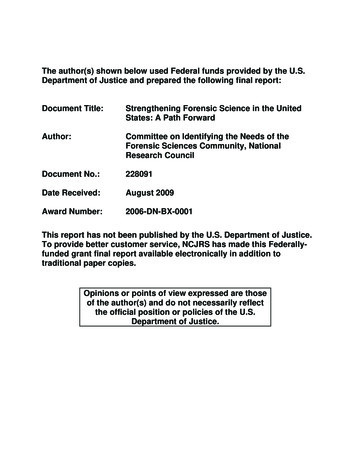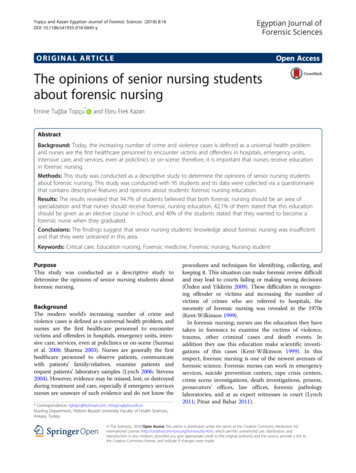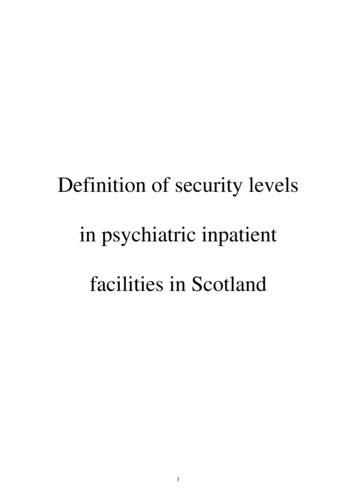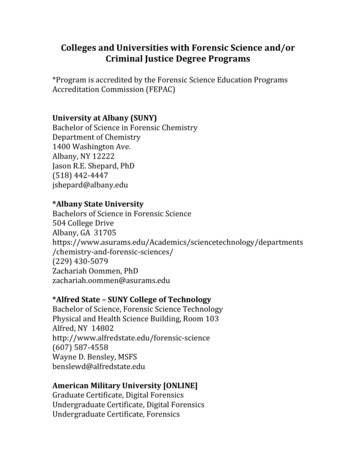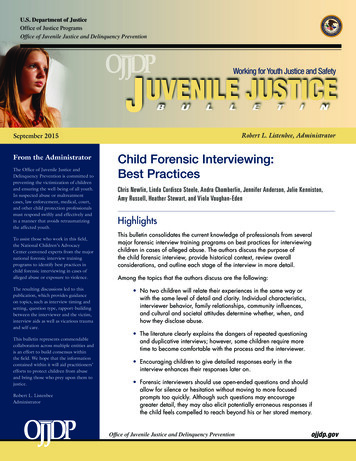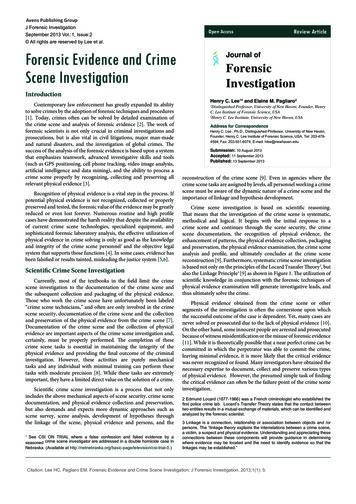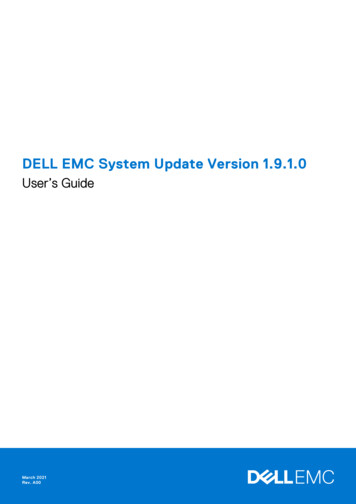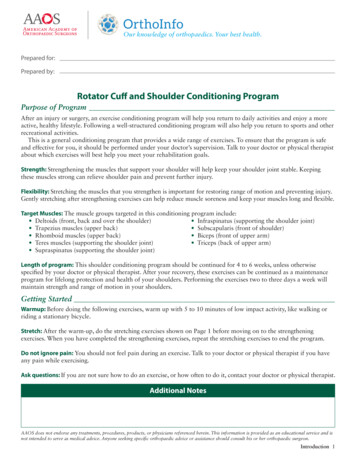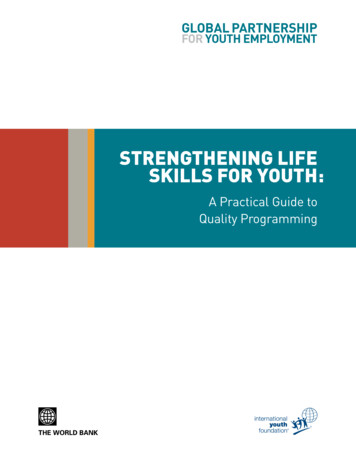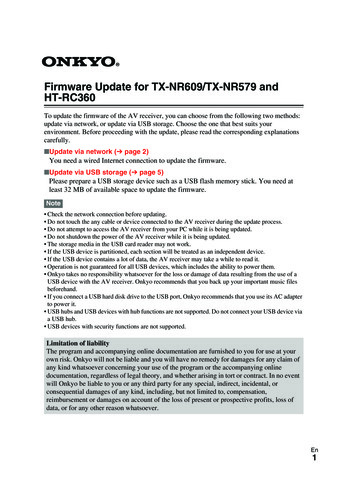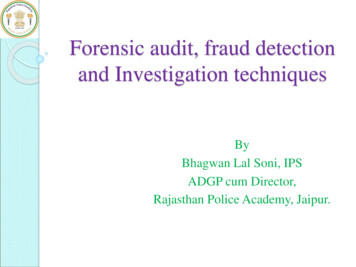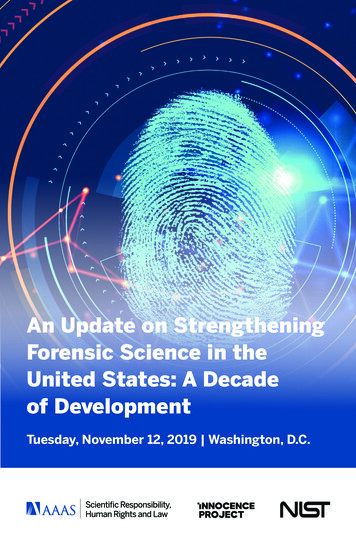
Transcription
An Update on StrengtheningForensic Science in theUnited States: A Decadeof DevelopmentTuesday, November 12, 2019 Washington, D.C.
An Update on StrengtheningForensic Science in theUnited States: A Decade ofDevelopmentTuesday, November 12, 2019AAAS HeadquartersWashington, D.C.In collaboration with
Tuesday, November 12, 20198:00Registration and Continental Breakfast8:30WelcomeJessica Wyndham, Director, Scientific Responsibility, Human Rightsand Law Program, AAAS8:40Keynote: The Importance of Forensic Science and Its Place in theScientific EnterpriseModerator: Deborah Runkle, Senior Program Associate, ScientificResponsibility, Human Rights and Law Program, AAASSpeaker: Thomas Albright, Professor and Conrad T. Prebys Chair,The Salk Institute for Biological Studies9:10Historical Perspectives: What Has Happened Since 2009Moderator: Joanne Carney, Director, Office of Government Relations,AAASSpeaker: John Butler, Special Assistant to the Director for ForensicScience, NIST9:30Federal Agencies: Research and FundingModerator: Alicia Carriquiry, Director, Center for Statistics andApplications in Forensic Evidence (CSAFE), Iowa State UniversitySpeakers:Rebecca Ferrell, Program Director, Division of Behavioral andCognitive Sciences, National Science FoundationGene Peters, Chief, Counterterrorism & Forensic Science Research,FBI LaboratoryJonathan McGrath, Policy Analyst, National Institute of JusticeRobert Ramotowski, Forensic Science Program Manager, NIST10:45Break11:00Breakthroughs in Foundational ResearchModerator: Theresa Harris, Project Director, Scientific Responsibility,Human Rights and Law Program, AAASSpeakers:JoAnn Buscaglia (Latent Fingerprints), Research Chemist,Counterterrorism and Forensic Science Research, FBI LaboratoryRobert Thompson (Toolmarks and Firearms), Senior ForensicScience Research Manager, Special Programs Office, NIST12:00Lunch2
31:00Keynote: An Australian ViewpointModerator: Anne-Marie Mazza, Senior Director, Committee onScience, Technology and Law, National Academies of Science,Engineering and MedicineSpeaker: Linzi Wilson-Wilde, Director, National Institute of ForensicScience, Australia1:30Breakthroughs in Laboratory ManagementModerator: Sarah Chu, Senior Science Policy Advisor, InnocenceProjectSpeakers:Linda Jackson, Director, Virginia Department of Forensic SciencePeter Stout, CEO and President, Houston Forensic Science Center2:30Human Factors/Cognitive BiasModerator: Steve Pierson, Director of Science Policy, AmericanStatistical AssociationSpeakers:John Hollway, Associate Dean and Executive Director of theQuattrone Center, University of Pennsylvania Law SchoolMelissa Taylor, Senior Forensic Science Research Manager, ForensicScience and Research Program, NIST3:15Break3:30What’s Happening in the Courts?Moderator: Joe Cecil, Fellow, University of California, Berkeley Schoolof LawSpeakers:Mark Larson, Chief Deputy, Criminal Division King CountyProsecutor’s Office, WashingtonJulia Leighton, General Counsel, Public Defender Service for theDistrict of Columbia (retired)Honorable Bridget McCormack, Chief Justice, Michigan Supreme Court4:45Wrap Up: Looking Back and Moving ForwardModerator: Glinda Cooper, Director of Science and Research,Innocence ProjectSpeakers:Richard Cavanagh, Director, Special Programs Office, NISTPeter Neufeld, Co-founder, Innocence ProjectJessica Wyndham, Director, Scientific Responsibility, Human Rightsand Law Program, AAAS5:15Reception
SpeakersThomas AlbrightThomas D. Albright is Professor and Conrad T. Prebys Chair at the Salk Institutefor Biological Studies in La Jolla, California. His laboratory seeks to understandthe brain bases of visual perception, memory and visually-guided behavior. Animportant goal of this work is the development of therapies for blindness andperceptual impairments resulting from disease, trauma or developmental disordersof the brain. A second aim of Albright’s work is to use growing knowledge of brain,perception and memory to inform design in architecture and the arts, to leveragesocietal decisions and public policy, and to advise on matters of law and justice.Albright received a Ph.D. in psychology and neuroscience from Princeton University.He is a member of the National Academies of Science, Engineering and Medicine(NASEM), a fellow of the American Academy of Arts and Sciences, and a fellowof the American Association for the Advancement of Science. Albright servedas co-chair of the NASEM Committee on Scientific Approaches to EyewitnessIdentification, which produced the 2014 report Identifying the Culprit: AssessingEyewitness Identification. He is a member of the NASEM Committee on Science,Technology and Law, and served on the National Commission on Forensic Science,an advisory body to the U.S. Department of Justice. Albright is currently a memberof the Human Factors Resource Committee of the NIST Organization of ScientificArea Committees for Forensic Science.JoAnn BuscagliaJoAnn Buscaglia is a Research Chemist with the Counterterrorism and ForensicScience Research Unit at the Federal Bureau of Investigation (FBI) Laboratory, whereshe has worked for more than 20 years. Prior to joining the FBI Laboratory, sheworked for almost a decade in academia and as a consultant for both private- andpublic-sector forensic, environmental, and industrial hygiene laboratories. Buscagliareceived her Ph.D. from the City University of New York in 1999, and a B.S. and M.S. inForensic Science (Criminalistics) from John Jay College of Criminal Justice. She hasdelivered over 100 technical presentations at professional and scientific conferences,and published book chapters and articles in the peer-reviewed scientific literature.Buscaglia is currently a Scientific and Technology Fellow at the Office of the Directorof National Intelligence, a member of the NIST Organization of Scientific AreaCommittees' (OSAC) Forensic Standards Board, a member of the Technical AdvisoryBoard for the Center for Statistics and Applications in Forensic Evidence (CSAFE),and a Steering Committee member for the International Fingerprint Research Group.In 2013, Buscaglia was honored with both the FBI Director’s Award for OutstandingScientific Advancement for the “Black Box” latent print examiner research, and thePaul L. Kirk Award, the highest honor given by the American Academy of ForensicSciences, Criminalistics Section (of which she is a Fellow).4
John ButlerJohn M. Butler is an internationally recognized expert in forensic DNA analysis and holdsa Ph.D. in analytical chemistry from the University of Virginia. He has written criminalcasework, paternity investigations, and many DNA ancestr y procedures. He has beenhonored in multiple White House ceremonies (2002 and 2015) for his work in advancingDNA testing. In 2011, ScienceWatch.com named him the world-wide high-impact authorin legal medicine and forensic science over the previous decade. He has received the GoldMedal (2008) and Silver Medal (2002) from the U.S. Department of Commerce, theScientific Prize of the International Society of Forensic Genetics (2003), and the Paul L.Kirk Award from the American Academy of Forensic Sciences (2017 ). Butler is a NISTFellow (highest scientific rank at NIST) and Special Assistant to the Director for ForensicScience and served as the Vice-Chair of the National Commission on Forensic Sciencefrom 2014 to 2017.Joanne CarneyJoanne Padrón Carney is the Director for Government Relations at AAAS. Since1997, she has managed all activities of the program, including production of theweekly AAAS Policy Alert; tracking legislation related to a wide range of policy issuesthat affect the research community; organizing an annual S&T policy workshopfor graduate students; briefings for congressional leaders and their staff; andformulating AAAS policy strategies, statements and testimony. She also serveson the AAAS Fellowship Advisory Committee, the Golden Goose Award SteeringCommittee, and the Task Force on American Innovation Steering Committee.Alicia Carriquiry5Alicia Carriquiry graduated with a degree in Agricultural Engineering in 1982 inMontevideo, Uruguay. She enrolled in a master’s degree program in animal geneticsat the University of Illinois in Urbana, and graduated in 1985. She then moved to IowaState University in Ames, where she completed a joint Ph.D. in statistics and animalgenetics in 1989. Since 1990, Carriquiry has been on the faculty in the Departmentof Statistics at Iowa State University. She is currently Distinguished Professor ofLiberal Arts and Sciences, President’s Chair in Statistics, and Director of the Centerfor Statistics and Applications in Forensic Evidence (CSAFE), a National Institute ofStandards and Technology (NIST) Center of Excellence. She is an elected member ofthe National Academy of Medicine, a Fellow of the American Statistical Association,the Institute of Mathematical Statistics, the International Society for BayesianAnalysis and the American Association for the Advancement of Science, and anelected member of the International Statistical Institute. Her research interestsinclude measurement error modeling, survey sampling and Bayesian methods. Inrecent years, she has become interested in learning algorithms and their applicationin various disciplines, in particular in forensic science.
Richard CavanaghRichard Cavanagh is the Director of the Special Programs Office at the NationalInstitute of Standards and Technology. He directly supports the NIST Directorand Associate Director for Laboratory Programs by helping ensure that researchsupporting forensics, greenhouse gases, and homeland and national securityprojects/programs is congruent with NIST’s research capabilities and overallprogrammatic priorities and overseeing the development and implementation ofNIST’s policies regarding Scientific Integrity and Research Misconduct. Cavanaghhas held several leadership responsibilities in addition to those at NIST. He is aFellow of the American Vacuum Society and of the American Physical Society.He served as the chairman of the Versailles Project on Advanced Materials andStandards, was a member of the World Anti-Doping Association’s Laboratory ExpertGroup, and co-chaired OSTP’s Interagency Working Group on Medical Imaging.Joe CecilJoe Cecil is a Fellow at the Civil Justice Research Initiative at the University ofCalifornia, Berkeley School of Law. He recently retired from the Division of Researchat the Federal Judicial Center, where he examined access to justice in federaldistrict courts as a result of policy changes regarding the use of dispositive motions(motions to dismiss, summary judgment, etc.). His research in this area has beencommissioned and relied upon by the advisory committees on federal rules of theJudicial Conference of the United States. While at the Center, Cecil also focused onthe role of scientific evidence in federal courts, conducting empirical research projectson admissibility of scientific evidence in civil and criminal litigation and the role ofcourt-appointed experts. Since 1990 he directed the Center’s Program on Scientificand Technical Evidence. As part of this program he developed the Center’s ReferenceManual on Scientific Evidence, and is collaborating on the development of the fourthedition of the Reference Manual, which will be published jointly by the Federal JudicialCenter and the National Academies. Cecil has been a member of the NationalAcademies’ Committee on Science, Technology & Law since it began in 1998. He hasbeen appointed as a member of a number of panels of the National Academies ofScience, Engineering and Medicine, including recent service on panels issuing reportson eyewitness identification (Identifying the Culprit, 2014) and forensic science(Strengthening Forensic Science in the United States, 2009). Cecil received his J.D.and a Ph.D. in psychology from Northwestern University.6
Sarah ChuSarah Chu joined the Innocence Project in September 2008. As the Senior Advisoron Forensic Science Policy, she supports policy work that focuses on improving thevalidity and reliability of forensic science. Prior to joining the Innocence Project, Sarahworked in executive search and as a middle school science teacher in the NYC publicschools. She also represents her community on her local community board. Duringher academic career, Sarah published work in plant biology and musculoskeletalepidemiology. Sarah graduated from the University of California, San Diego withbachelor degrees in Biochemistry/Cell Biology, Communication, and a master’s inBiology. She also holds a master’s in Epidemiology from Stanford University.Glinda CooperGlinda Cooper is the Director of Science and Research at the Innocence Project.Prior to joining the Innocence Project in 2016, Cooper led efforts to create andimplement an evidence-based, systematic review framework for the evaluation ofchemical hazards at the National Center for Environmental Assessment at the U.S.Environmental Protection Agency. She also directed a multidisciplinary researchprogram in environmental health and autoimmune diseases at the NationalInstitutes of Health, and is an internationally-recognized expert in environmentalepidemiology and women’s health. At the Innocence Project, Cooper is focusing onefforts to strengthen the scientific basis of forensic disciplines and evidence-basedreforms aimed at reducing wrongful prosecutions and convictions. Cooper receiveda doctorate from the Department of Epidemiology at the University of NorthCarolina at Chapel Hill and a master’s degree in Health Policy and Managementfrom the Harvard School of Public Health. She has published more than 100 peerreviewed papers based on her research and has been an invited speaker andworkshop organizer at numerous international and national meetings.Rebecca FerrellRebecca Ferrell is the Program Director for the Biological Anthropology Program at theNational Science Foundation (NSF). Ferrell manages a diverse portfolio of research onhuman and primate evolution, behavior, and biology. She also works with colleaguesacross NSF and at other agencies to identify and cultivate basic research with relevanceto forensic science, and serves as the program officer for the Center for AdvancedResearch in Forensic Science, an NSF-funded Industry-University CooperativeResearch Center. Ferrell received her Ph.D. in Anthropology from the PennsylvaniaState University, after which she was a postdoctoral fellow at Georgetown University’sCenter for Population and Health and an assistant professor of Anthropology at HowardUniversity. She has also served as a Scientific Review Officer at the National Institute7
on Aging, National Institutes of Health (NIH). Ferrell specializes in skeletal and dentalanthropology and is broadly interested in understanding stress, health, aging, andmortality in past and present human populations.Theresa HarrisTheresa Harris is a Project Director in the AAAS Scientific Responsibility, HumanRights and Law Program. Her interests include the implementation of internationallyrecognized human rights principles in U.S. laws and policies and the intersectionsof information technology, human rights and law. Prior to joining AAAS she ledHuman Rights USA as its Executive Director, where she represented survivors ofhuman rights violations before United States courts, the Inter-American humanrights system and United Nations human rights mechanisms. Theresa has servedon the Board of Directors of Amnesty International USA and is a member of thegoverning body of the World Organization Against Torture (OMCT). She holds a B.A.in Anthropology, an M.S. in Urban and Regional Planning and a J.D. from AmericanUniversity Washington College of Law.John HollwayJohn F. Hollway is Associate Dean and Executive Director of the Quattrone Centerfor the Fair Administration of Justice at the University of Pennsylvania Law School.His research helps organizations confront challenges and turn negative occurrencesinto opportunities for quality improvement. He is a national thought leader on theuse of root cause analysis in criminal justice, and is a frequent consultant to criminaljustice agencies and corporations on quality improvement and measurementissues. He is the author of numerous publications, including Conviction ReviewUnits: A National Perspective (2016), A Systems Approach to Preventing Errorsin Criminal Justice (2014), and Killing Time: An 18-Year Odyssey from Death Rowto Freedom, winner of the National Independent Book Award for non-fiction in2011, and one of the Chicago Sun-Times’ Best Books of the Year. Hollway holds abachelor’s degree from Penn State University in Diplomatic History with a minor inEast Asian Studies, a J.D. with honors from the George Washington University LawSchool, and a MAPP degree with Distinction from Penn State University.Linda JacksonLinda Jackson has served as the Director of the Virginia Department of ForensicScience (DFS) since her initial appointment in 2013. She has a B.S. degreein Chemistry from Wake Forest University and an M.S. in Chemistry from theUniversity of North Carolina at Charlotte. She began her career with DFS in1995 as a Controlled Substances Examiner and then was promoted to MassSpectrometer Operator, Section Supervisor, Controlled Substances Section8
Chief and Chemistry Program Manager before assuming her current position. AsChemistry Program Manager, she managed all technical aspects of the ControlledSubstances, Toxicology and Trace Evidence disciplines. Jackson currently serves asSecretary for the American Society of Crime Laboratory Directors (ASCLD) Boardof Directors and is a member of the NIJ Forensic Laboratory Needs-TechnologyWorking Group (FLN-TWG). She is a member of the American Academy ofForensic Sciences (AAFS), the international Scientific Working Group for SeizedDrug Analysis (SWGDRUG), the ASTM E-30 Committee on Forensic Science, andthe Mid-Atlantic Association of Forensic Scientists (MAAFS). She served on theNational Commission on Forensic Science from 2013–2017 and the White HouseSubcommittee on Forensic Sciences Interagency Working Group on Standards,Practices and Protocols from 2009–2012.Mark LarsonMark Larson received his J.D. in 1985 and has served as a King County DeputyProsecutor throughout his career. In 1993, he was named Chief Deputy of theCriminal Division, which employs over 170 lawyers. He has a long-standing interestin eyewitness identification and wrongful convictions, and helped author theNational Institute of Justice’s Eyewitness Evidence: a Guide for Law Enforcement(1998). More recently, he co-authored Eyewitness Identification: An Update on WhatChiefs Need to Know, published in The Police Chief (2013). Larson also authored TheExoneration of Brandon Olebar in The Marshall Project (Feb. 2015).Julia LeightonJulia Leighton is the former general counsel for the Public Defender Service for theDistrict of Columbia (PDS). As general counsel, Leighton advised the PDS’s Boardof Trustees, the PDS management team, and PDS lawyers on a wide variety of legalissues and managed litigation involving PDS. Leighton is a former two term memberof the D.C. Bar Legal Ethics Committee and the D.C. Rules of Professional ConductReview Committee. In addition to her duties as general counsel, she was a memberof PDS’s Forensic Practice Group and was a 2001 founding member. In 2014Leighton was appointed by the U.S. Attorney General to the National Commissionon Forensic Science. Leighton served as a voting member on the Commission untilits charter was sunset and served on three of its subcommittees. Prior to becomingPDS’s general counsel, she spent eleven years litigating criminal cases at both thetrial and appellate level; eight years as a staff attorney at PDS, and three years as atrial attorney in the Environmental Crimes Section of the U.S. Department of Justice.Leighton received her B.A. in Economics from Bowdoin College, Magna Cum Laude,and her J.D. from the Georgetown University Law Center, Cum Laude.9
Anne-Marie MazzaAnne-Marie Mazza is Senior Director of the Committee on Science, Technologyand Law at the U.S. National Academies of Sciences, Engineering, and Medicinewhere she has led numerous academy activities on 1) science in the courts (suchas forensic sciences and eyewitness identification), 2) policies for academicresearch (such as intellectual property and dual use research) and 3) governanceof emerging technologies (such as synthetic biology and human genome editing).Previously she worked at the White House Office of Science and Technology Policywhere she led an effort on the government-university research partnership. Mazzaearned a B.A., M.A., and Ph.D. from The George Washington University. She is afellow of the American Association for the Advancement of Science.Bridget Mary McCormackChief Justice Bridget Mary McCormack joined the Michigan Supreme Court inJanuary 2013, and became the Chief Justice in January 2019. McCormack startedher legal career in New York City. In 1996 she joined the Yale Law School faculty.She then joined the University of Michigan Law School faculty in 1998, where shetaught criminal law, legal ethics and various clinics. She was named Associate Deanfor Clinical Affairs in 2002. She was elected to the American Law Institute in 2013.The U.S. Department of Justice and the U.S. Department of Commerce’s NationalInstitute of Standards and Technology appointed her to the National Commission onForensic Science in 2014. She serves as an editor on the ABA’s preeminent journal,Litigation. In 2019, Governor Whitmer appointed her as Co-Chair of the MichiganJoint Task Force on Jail and Pretrial Incarceration. McCormack continues to teach atthe University of Michigan each year as well as publish in professional journals andlaw media. McCormack earned her J.D. from New York University.Jonathan McGrathJonathan McGrath serves as Senior Policy Analyst with the Department of Justice’sNational Institute of Justice (NIJ), Office of Investigative and Forensic Sciences inWashington, D.C. He joined NIJ in 2015 and supported the National Commission onForensic Science, the DOJ Needs Assessment of Forensic Laboratories, and managesthe NIJ Forensic Technology Center of Excellence program and the NIJ ForensicLaboratory Needs Technology Working Group. Prior to joining NIJ in 2015, he was aforensic scientist with the U.S. Customs and Border Protection’s Laboratories andScientific Services Directorate in Houston, TX (2007–2011) and worked at CBP LSSDheadquarters office in Washington, D.C. where he supported CBP’s trade, forensic,and WMD operations programs (2011–2015). McGrath holds a Ph.D. in AnalyticalChemistry from Georgia Tech, an M.S. in Forensic Science from the University ofIllinois at Chicago, and a B.S. in Chemistry from the University of Dallas.10
Peter NeufeldPeter Neufeld, a nationally recognized civil-rights lawyer, has spent over 35 yearstrying cases on behalf of victims of police misconduct and wrongful convictions.These trials have led to numerous substantial verdicts and settlements and causedsystemic criminal-justice reforms. Litigating civil-rights cases in trial and appellatecourts nationwide, including the U.S. Supreme Court, he has pioneered key legaltheories including the Fourth Circuit Fabricated Confession Theory. Neufeld, alongwith Neufeld Scheck & Brustin, LLP partner Barry Scheck, co-founded and co-directsthe Innocence Project at the Benjamin N. Cardozo School of Law. The InnocenceProject has been responsible in whole or in part for exonerating most of the over 300men and women to be cleared through post-conviction DNA testing. He graduatedfrom the University of Wisconsin and received his law degree from New YorkUniversity School of Law.Gene PetersGene Peters is Chief of Counterterrorism and Forensic Science Research at the FBILaboratory. He leads a staff of research scientists to develop new and improvedmethods to analyze forensic evidence and to strengthen the scientific foundationsof forensics. His research portfolio includes projects in anthropology, biology,chemistry, explosives analysis, genetics, geology, microbiology, statistics, andtoxicology. Prior to joining the FBI Laboratory, he was a senior manager at the U.S.Nuclear Regulatory Commission, where he worked to ensure the safe managementof nuclear materials and spent nuclear fuel, worked as a scientific consultant, andserved in the U.S. Marine Corps.Steven PiersonSteve Pierson is Director of Science Policy for the American Statistical Associationwhere he works to raise the profile of statistics in policymaking and advocates onthe interests of statisticians. He was previously head of government relations atthe American Physical Society and associate professor of physics at WorcesterPolytechnic Institute. Pierson received his Ph.D. in physics from the University ofMinnesota-Twin Cities.11
Robert RamotowskiRobert Ramotowski is the Forensic Science Program Manager at the National Instituteof Standards and Technology (NIST). Prior to his position at NIST, he served nearly25 years as a research chemist, document analyst, and Chief Forensic Chemist of theUnited States Secret Service Forensic Services Division’s Laboratory in Washington,D.C. He has published more than 30 articles on latent print and document chemistryin several peer reviewed journals and has given more than 100 lectures and workshopsin the U.S. and in more than a dozen foreign countries. Ramotowski was one of thefounding members of the International Fingerprint Research Group and since 2015 hasserved as a member of the group’s steering committee. He earned his B.S. and M.S. inChemistry from the George Washington University.Deborah RunkleDeborah Runkle is a Senior Program Associate in the AAAS Scientific Responsibility,Human Rights and Law Program, where she concentrates on issues at theintersection of science and law. She serves as Associate Staff Officer for theNational Conference of Lawyers and Scientists, a joint standing committee of theAAAS and the Science & Technology Law Section of the American Bar Association.She also is on the Leadership Group for that Section. Her current interests includeforensics and expert witnesses. She is manager and/or director for educationalprograms for state, federal, and administrative law court on neuroscience, the opioidcrisis, and climate science. Prior to coming to AAAS, she was a science advisor atMorgan Associates Chartered, a boutique litigation law firm and before that at theNational Institutes of Health, National Institute of Mental Health Intramural programon neuropsychopharmacology.Peter StoutPeter Stout is CEO and president of Houston Forensic Science Center (HFSC). Heinitially joined the agency in 2015 as its chief operating officer and vice president. Hehas more than 20 years of experience in forensic science and forensic toxicology. Priorto joining HFSC, Stout worked as a senior research forensic scientist and director ofoperations in the Center for Forensic Sciences at RTI International. Stout also hasserved as president of the Society of Forensic Toxicologists (SOFT). He representedSOFT in the Consortium of Forensic Science Organizations and has participated innational policy debates on the future of forensic sciences in the United States. Heis currently president of the Texas Association of Crime Lab Directors. Stout has adoctorate in toxicology from the University of Colorado Health Sciences Center inDenver. Stout also served as an officer in the U.S. Navy Medical Service Corps.12
Melissa TaylorMelissa Taylor is a senior forensic science research manager within the SpecialPrograms Office of the U.S. Department of Commerce’s National Institute ofStandards and Technology. Her work within the Forensic Science Program focusesprimarily on impression and pattern evidence-related research, process mapping,and integrating human-factors principles into forensic sciences. Publicationsinclude The Biological Evidence Preservation Handbook: Best Practices forEvidence Handlers, Latent Interoperability Transmission Specification, and LatentPrint Examination and Human Factors: Improving the Practice through a SystemsApproach. Taylor has 15 years in the forensic science industry including positionswith Booz Allen Hamilton, Lockheed Martin, and as a consultant to the NationalInstitute of Justice. Taylor is the study director for the Expert Working Group Serieson Human Factors in Forensic Sciences and is an active member of the AmericanSociety for Quality, INTERPOL AFIS Expert Working Group, and InternationalAssociation of Identification. She previously served as a member of the U.S.Department of Justice National Commission on Forensic Science Human FactorsSubcommittee and as co-chair of the White House Subcommittee on ForensicSciences Latent Print AFIS Interoperability Task Force.Robert ThompsonRobert M. Thompson is a Senior Forensic Science Research Manager with theSpecial Programs Office-Forensic Sciences at the National Institute for Standardsand Technology (NIST) for 11 years. He has almost 40 years of experience as aForensic Scientist and Criminalist. He is certified in Criminalistics by the AmericanBoard of Criminalistics (ABC) and is a past Chairman and current member of theAssociation of Firearm and Toolmark Examiners (AFTE) Certification ProgramCommittee. He is a Distinguished Member of AFTE and a Fellow of the AmericanAcademy of Forensic Sciences. Prior to joining NIST, Thompson was a SeniorFirearms and Toolmark Examiner for the Bureau of Alcohol, Tobacco, Firearmsand Explosives (ATF) Forensic Science Laboratories, and a Forensic Scientist andCriminalist in crime laboratories with the Washoe County Sheriff’s Department(Reno, Nevada), the Oregon State Police, and the Genelex Corporation. Thompsonhas a Master of Forensic Science degree from the George Washington Universityin Washington, D.C. and a Bachelor of Science degree in Forensic Science with a
Forensic Science (Criminalistics) from John Jay College of Criminal Justice. She has delivered over 100 technical presentations at professional and scientific conferences, and published book chapters
